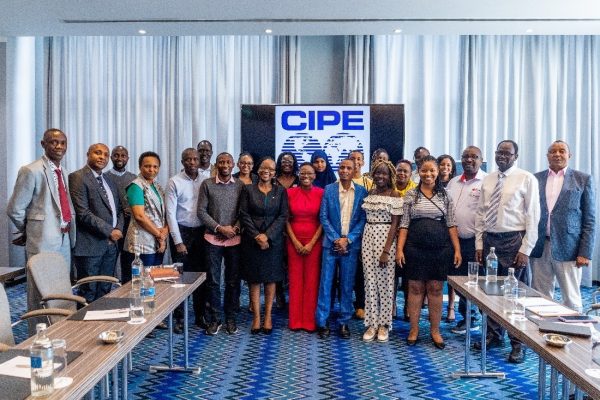
Where human resilience and the entrepreneurial spirit intersect, there lies an array of untold stories – the stories of refugee entrepreneurs spurring innovation amidst adversity. Around the world today, over 108 million people are forcibly displaced, including both refugee and internally displaced populations. Across refugee communities, entrepreneurship is a vehicle to achieve economic prosperity and social integration, as well as to restore livelihood to refugees that may feel lost or isolated.
This year, Ukrainian refugees opened 10% of all new sole-proprietor businesses in Poland, and Syrian refugees have opened over 10,000 new businesses in Turkey since 2011. Moreover, entrepreneurship is a key proponent of democratic values, as the entrepreneurial spirit inherently embodies the freedoms of expression and of economic opportunity. According to Kim Bettcher, Director of Policy and Program Learning at the Center for International Enterprise (CIPE), entrepreneurship democratizes opportunity and creates more inclusive economies. In refugee communities where economic opportunities are few and far between, entrepreneurship offers an outlet for civic engagement and cultivates a new sense of belonging.
Challenges Refugee Entrepreneurs Face
In October, the United Nations High Commissioner for Refugees (UNHCR) published the first Global Roadmap for Refugee Entrepreneurship, which highlights the needs, challenges, and opportunities facing refugee entrepreneurs. For example, displaced Rohingya migrants in Bangladesh can only work and start businesses outside of resettlement camps if the government grants them formal refugee status, and similar labor restrictions exist for Syrian refugees in Jordan. Startups led by refugees encounter setbacks procuring essential financial resources and knowledge, especially as legal and bureaucratic barriers further compound access to vital information. Refugee entrepreneurs must also comprehend the nuances of their new markets, such as regulatory frameworks, in addition to consumer behaviors and cultural differences that affect business operations. Moreover, legal barriers prevent refugees from borrowing from banks, as a lack of formal credit history is perceived as a financial liability.
In addition to these challenges, refugees themselves must be convinced that their lives will be better off by engaging in entrepreneurship rather than solely depending on refugee relief efforts. While many humanitarian aid organizations provide basic needs assistance for refugees, such as food, shelter, and clothing, these interventions often neglect the training or assistance necessary for refugees to become self-reliant and create sustainable livelihoods.
Successes and A Path Forward
Entrepreneurs are likely to encounter hardships, yet refugees’ ability to endure and rebound from adversity makes them ideal self-starters. While refugees may arrive with limited material possessions, they carry with them proud cultural heritage and unwavering perseverance. A 2020 OECD report highlights the importance of civic engagement for refugees to shape their decision-making skills and cultural understanding around issues concerning their lives. To address this need, CIPE leverages its global partner network to develop inclusive and accessible enterprise ecosystems. For example, through the Livelihoods Innovation through Food Entrepreneurship (LIFE) project in Turkey, CIPE supported over 300 food entrepreneurs from refugee and host communities to foster job creation, cross-cultural engagement, and an enhanced quality of life. Food Enterprise Centers provided culinary training and resources to the entrepreneurs and equipped Syrian refugees with the necessary skills to sustain their livelihoods.
CIPE empowers entrepreneurs to engage further in their local economies and democracies and enhances the capacity of refugee advocates and entrepreneurs around the world. In 2021, former CIPE Youth Leader Doris Mwikali led a project in Kenya to grant five refugee entrepreneurs in the Kakuma Refugee Camp access to credit and connect an additional 15 young entrepreneurs to advocates through online workshops. To better understand the lived experiences of refugee entrepreneurs, CIPE and Mwikali brought together refugee leaders, business associations, and researchers for a multistakeholder forum in Nairobi in 2023. The forum culminated in a call to action for the Kenyan government and other key stakeholders to create an ecosystem for the financial sector to invest in refugee economies in Kenya. Multi-stakeholder efforts like these enable participation in policy development and civic life by creating an enabling environment for refugees in fertile markets.
The global refugee crisis requires a multifaceted and collaborative response that extends far beyond humanitarian aid. Refugees are too often seen as a drain on resources, and this perception is compounded by both governments and communities neglecting the potential value of refugee entrepreneurs. CIPE will continue to work with its private sector partners to amplify the voices of refugee entrepreneurs and aid them in their advocacy for economic and democratic inclusion. This collective endeavor is the key to unlocking the full potential of displaced individuals and securing sustainable livelihoods for the whole of society.
Published Date: October 18, 2023
